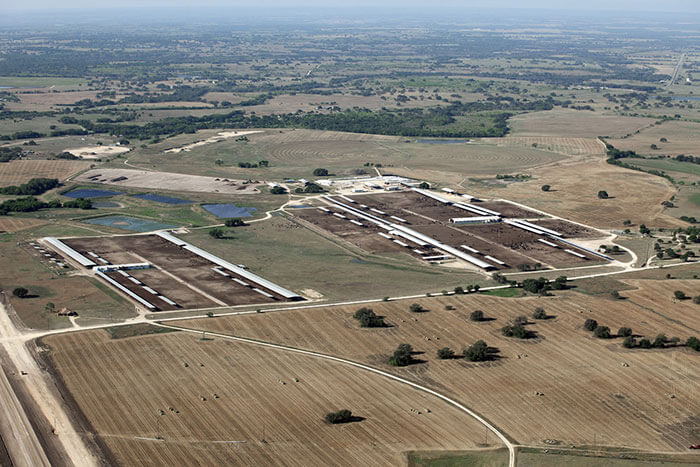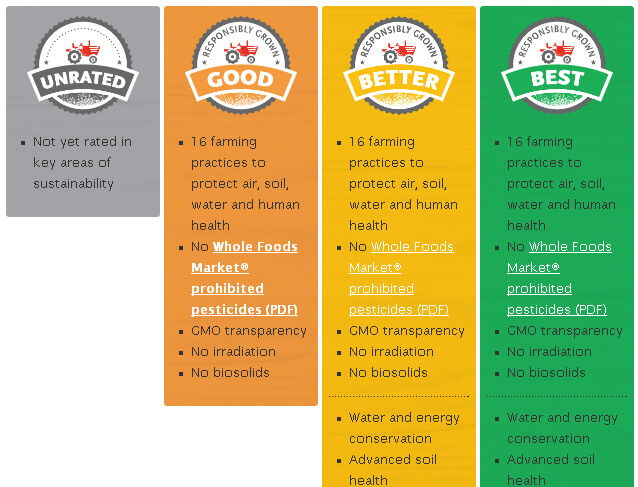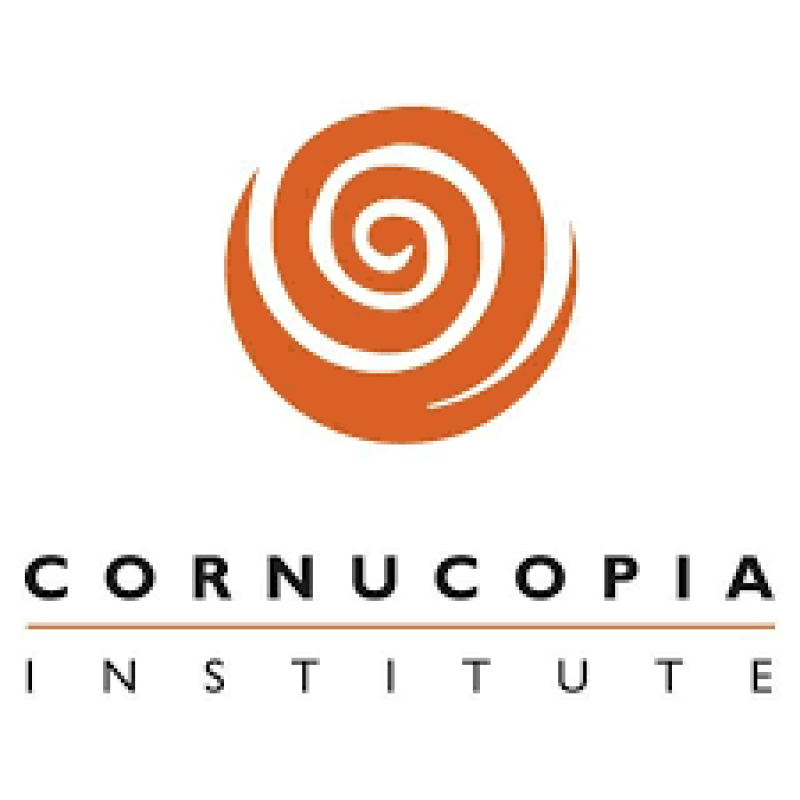The Cornucopia Institute (Cornucopia) was launched in 2004 by Mark Kastel and Will Fantle. It’s initial funding is murky. A claim that Cornucopia was started with donations from Organic Valley, a large farming cooperative, has been disputed by Kastel. Kastel was a public relations consultant for much of his career who, according to Kastel, helped launch the Organic Valley brand in the 1980s and 90s. He wrote in 2011:
Then I helped found the Cornucopia Institute eight years ago, when it looked like the wheels would fall off of this movement; when the giant corporate agri-businesses that has squeezed family farmers out of conventional farming, and that were responsible for the deterioration in the nutrient level and the safety of our food, were buying out, on a wholesale basis, all the brands that had launched the organic commercial movement.
Organic Valley is a cooperative of organic farmers based in La Farge, Wisconsin. Founded in 1988, it is the largest organic farmer-owned cooperative in the world with over 1,800 farmer-owners across the United States, Canada and Australia. Organic Valley markets products in all 50 states and exports to 25 countries. In 2015, annual sales topped $1 billion. The NGO is nearby in La Farge, WI.
Like Cornucopia, Organic Valley is critical of GMOs, using it as a symbol of conventional farming and the central point of difference with organic farming, calling it a “relatively new and unproven technology” that has led to the false promises that it can “feed the world.” It writes, contrary to the scientific consensus, “We don’t know if genetically engineered crops are safe, but we follow the precautionary principle: farming practices, such as the use of GMOs, should be prohibited until proven beyond doubt to be safe for animals, the environment and people.” Organic Valley has been a major funder of Charles Benbrook, an economist and former adjunct professor at Washington State University who has written numerous articles critical of genetic engineering and supportive of organic farming.
[NOTE: Kastel emailed the GLP asserting that the Cornucopia-Organic Valley financial connection is a “rumor” and “conjecture” and has threatened the GLP with a possible law suit for raising the issue. Cornucopia never legally challenged prior assertions of a seminal relationship between Organic Valley and Cornucopia. Kastel maintained that “Cornucopia was formed because its two cofounders could not convince [Organic Valley] to go after illegally operated factory farms that were undermining the organic dairy industry.”]Cornucopia describes itself on its website as an “organic industry watchdog”:
The Cornucopia Institute engages in educational activities supporting the ecological principles and economic wisdom underlying sustainable and organic agriculture. Through research and investigations on agricultural issues, The Cornucopia Institute provides needed information to consumers, family farmers, and the media.
Cornucopia often acts as a vessel for pro-organic and anti-GMO propaganda. Its “Media News” section offers a potpourri of straight news of interest to the organic community, pro-organic propaganda news releases, and posts from fringe, even quack anti-GMO websites, such as a February 3, 2016 reposting of an attack blog by Carey Gillam, the former Reuters reporter, who has taken on the position of ‘research director” for US Right to Know in its campaign to discredit biotechnology scientists. It has aggressively supported mandatory GMO labeling campaigns.
Cornucopia’s primary modus operandi is investigating and using legal measures targeted mostly at large-scale “corporate” organic companies, many of whom are direct competitors of Organic Valley, usually with an accusation that the target business is engaging in practices that violate USDA organic regulations. Cornucopia has also filed legal complaints against some of Organic Valley’s suppliers.
In 2012, Cornucopia posted on its website a white paper that it calls “The Organic Watergate,” supposedly documenting that the USDA has worked in a “conspiracy” with corporations to “cripple” the Organic Foods Production Act of 1990. Critics of Cornucopia claim that it targets farms that do not fit Cornucopia’s image of what organic farming should be.
Cornucopia has aggressively challenged organic companies that it believes does not uphold its views of how the organic business should operate. In 2009, Cornucopia filed a formal legal complaint claiming that Dean Foods (American Food and Beverage Company that specializes in dairy products) was mislabelling it’s Silk almond milk as organic. Cornucopia also filed a report in which it claimed many veggie burgers contained hexane. The report noted that those products labeled ‘natural’ or ‘made with organic ingredients’ were likely to contain hexane. It also put our “scorecards” that rate “how organic” various companies organic products are. For example, scorecards exist for dog food, eggs and cereal.
In 2014, Cornucopia released the results of its investigation into several large “corporate” organic farms, including Aurora Organic Dairy, Horizon Organic and Silk, releasing aerial photos of 14 large-scale organic farms–five dairies and nine chicken operations that supply well-known store brands such as Walmart, Target and Costco. Along with other groups that included Friends of the Earth, Credo, Maine Sierra Club, Mercola.com, Weston Price Foundation, Farm to Consumer Legal Defense Fund, Maine Organic Farmers and Growers Association and Green America, it worked with the lobby group the Organic Consumers Association to organize transport for people to attend a Capitol Hill protest. The goal was to show how little these larger organic operations portray the family farm image that most consumers associate with organic farming and also to target farms that it believed were in violation of organic farming regulations. As part of its investigation Cornucopia posted several photos of these farms on its websites. The following picture was described by Cornucopia as:
“Overview of the two feedlots. It’s important to note that virtually all the surrounding fields, which could be used for pasture, have been recently cut and baled for hay. There is effectively no pasture available to these animals.”

Mark Kastel said of the investigation: “We targeted them based on scale…When you get to [5,000] or 10,000 cows, you know that they’re gaming the system.” Cornucopia ended up filing formal complaints against 14 operations for what it claimed were violations of USDA organic regulations.
The campaign was highly criticized by some groups, particularly by some organic farmers. Nate Lewis, a specialist on organic certification of livestock operations for the Organic Trade Association, condemned the photos for lacking context, writing, “for any of these photos, I could come up with a completely valid reason for what you’re seeing.” For example animals could be inside during the time these photos were taken because it was too hot or too cold outside.
Cornucopia also published photos of an egg-producing facility in Idalou, Texas owned Chino Valley Ranches. The photos, Cornucopia claimed, showed that chickens at the farm were not being given the amount of outside access required by organic regulations. But according to records obtained by National Public Radio from the company’s general manager, on the day that the photos were taken the chickens did have sufficient access to the outside.
Aurora Organic Dairy has claimed that one of the photos, identified as an Aurora operation by Cornucopia did not actually belong to Aurora. Aurora had owned the farmland but had sold the land six years prior and at the time of the photo the land was being used as a conventional, non-organic, heifer-raising facility.
In 2015, Cornucopia launched a campaign against Whole Food for the grocery chain’s “Responsibly Grown” labeling system. The Whole Foods labels rate produce based on a number of factors such as GMO Transparency, farming practices that protect air, soil and human health, and pesticides usage. The overall goal of this labelling system was to give customers more information about how the food they were buying was grown.

In June 2015, Cornucopia wrote a formal letter to Jessica Rich, the Director of the Bureau of Consumer Protection of the Federal Trade Commission. In the letter, penned by Kastel, Cornucopia requested, “…that the Federal Trade Commission investigate Whole Foods Market of Austin, Texas, for consumer fraud and mislabeling of food products.” In it’s July 2015 newsletter, Cornucopia explained its chief frustration with the labeling system, stating:
Quite frankly, we don’t understand how anyone who knows as much about organics as WFM [Whole Foods Market] founder Mr. Mackey, and the other top management at Whole Foods, could ever call conventional food the “BEST.”
Cornucopia also objected to the fees farmers would have to pay to comply with Whole Food’s labels:
Here was a corporation, with a market capitalization exceeding $14.5 billion, asking mostly family-scale farmers, some of the best farmers in this industry, to pony up between $5,000 and $20,000 to comply with the program’s reporting requirements and, for some, purchase new equipment.
In July 2015, Cornucopia announced that Whole Foods had bowed to its demands. Included in the changes was a provision that any organic farm would receive a minimum “good” rating, whether the farm chose to participate in the labeling program or not. In contrast, conventional farmers who chose not to participate would continue to receive an “unrated” grade. Inspections were also eliminated, and replaced with a farmers own word.
Note: Cornucopia is known for its aggressive legal tactics. sometimes making slander and libel threats to journalists, corporations or organizations that it comes into conflict with. Jon Entine, executive director of the GLP, has been the recipient of such threats previously. The GLP was also legally threatened after this post first appeared. GLP had used publicly available documents in preparing the original post. GLP received numerous aggressive and threatening emails from Mark Kastel after the post first appeared. Kastel contested some of the facts and the tone of the posting. Although we are not convinced that some or all of his representations are accurate, as he provided no documentation as to their veracity, despite GLP requests, we did modify and qualify the sections that he challenged. Nonetheless, Kastel continues to threaten the GLP with legal action, and his tried to interfere in the GLP’s First Amendment protected right to report on issues of public interest involving a well known 501c3 charity. GLP has operated fully within the boundaries of the First Amendment and stands by the blog as posted, and the open and cooperative process it engaged in with Mr. Kastel in resolving his concerns. Sections of Mark Kastel’s bullying threat letter is below:
We would ask that you pull down the initial post and create a new URL and promote it the same manner that you did the original webpage. If you did any outreach, through email, social media or any other vehicle, we would respectfully ask that you promote the new posting in the same manner. It would include the correction as an introduction, and be overtly title as “Correction on Cornucopia Background,” and then you can include your biased appraisal of our organization as you see fit.
This will save both of us a lot of time, trouble and expense and possibly increased exposure and scrutiny of your practices. We have saved screenshots of your original work and in addition to contacting our legal team will reach out to media critics and others that might have an interest in how industry uses surrogates to attack public interest watchdogs.
Please let me know if you’d like to work out a settlement. If you post this correction, and meet our requirements for its dissemination, we will be happy to commit not to pursue further legal action.
The GLP is an independent public interest watchdog. The GLP cordially declined to capitulate to Cornucopia’s attempts to subvert the First Amendment. We stand by our profile and our transparent reporting process. After the positing of Kastel’s verbatim email, GLP received another email from Kastel claiming, “I just read your update and it contains some additional false information,” Kastel refused to respond to a GLP request to elaborate as to what “false information” was posted.
Organization Details
Cornucopia Institute
PO Box 126, Cornucopia, WI 54827
(608) 625-2000
EIN 20-1075143 (ruling year 2005)
- 2008 revenue: $324,005
- 2008 expenses: $275,334
- 2012 revenue: $668,748
- 2012 expenses: $519,453
- 2013 revenue: $882,000
- 2013 expenses: $630,7000
- Primary income sources: Contributions (corporate)
- 501c3
KEY PEOPLE
- Mark Kastel, co-founder (2012 compensation $86,000) currently acts as its Senior Farm Policy Analyst. He also directs its Organic Integrity Project. For almost 20 years prior to Cornucopia’s launch he was president of M. A. Kastel and Associates, Inc. His professional practice included political consulting, lobbying on behalf of family farm groups, and business development work benefiting family-scale farmers.
- Will Fantle, co-founder (2012 compensation $51,000) currently serves as the organization’s Research Director. Previously, he was a regular contributor of feature articles on environmental, resource, food, and health issues for national magazines and urban weekly papers. He is a 2001 recipient of an award from Fairness and Accuracy in Media’s Project Censored for his story, Plutonium Pancakes. Mr. Fantle has also worked as webmaster for the Wisconsin Stewardship Network, a coalition of the state’s hunting, fishing and environmental groups.Mr. Fantle graduated with honors from the UW-Eau Claire with degrees in Economics and Political Science.
Board of Directors
- Helen Kees (Board President) is an organic beef farmer and fresh-market vegetable producer. She grew up on a dairy farm near Durand, Wisconsin. A tussle with a neighbor’s pesticide overspray in the early 1990s opened her eyes to the health and environmental concerns associated with the use of agrichemicals. She later became the first certified organic beef farmer in the state of Wisconsin.
- Kevin Engelbert (Board Vice President) is the owner/operator of Engelbert Farms, the first certified organic dairy farm in the US, certified since 1984. He farms about 1,800 acres and produces organic milk, veal, beef, pork, pasture, hay, corn, soybeans, and vegetables. Kevin is a fifth generation dairy farmer in New York State, and recently completed a five-year term on the USDA’s National Organic Standards Board. Kevin was involved with NOFA NY (Northeast Organic Farming Association of New York) from the early 1980s until the late 1990s, and helped with the development of NOFA NY’s organic standards. Kevin graduated from Hamilton College in Clinton, NY, with a Bachelor of Arts degree in Economics with a minor in Mathematics.
- Dr. Barry Flamm (Secretary) operates a certified organic sweet cherry orchard in Montana. He is the immediate past chair of the National Organic Standards Board, his term concluding in 2012. Dr. Flamm previously served on the Montana Governor’s Council helping develop the Montana Department of Agriculture Organic Certification Program, and he was a founder and vice chair of the Montana Organic Association.
- Mitch Blumenthal (Interim Treasurer) is the President and Founder of Global Organic/Specialty Source, Inc. Mitch purchased ten acres of organic farmland in 1995 and continues to grow vegetables, fruits, herbs, and specialty items at Blumenberry Farms. In 1999, he opened Global Organic/Specialty Source, now one of the most significant organic distributorships in the Southeast United States. Celebrating its 15th year in business, the company’s mission is to get organic foods into as many mouths as possible. Mitch remains involved with the Sarasota based All Faith’s Food Bank (as Past Chairman of the Board) and he supports The Manatee Food Bank through major food donations. He is a founding member of the Organic Produce Wholesalers’ Coalition (OPWC).
- Bill Heart is a hunter and fishermen and a very active member and officer of a number of conservation, environmental, and watershed protection organizations. He is past president of the Wisconsin chapter of Trout Unlimited. A commercial printer by trade, he previously owned a printing company in Ashland and also produces maple syrup on his land in northern Wisconsin.
- Goldie Caughlan, recently retired after a long and noteworthy career as a nutrition educator with the nation’s largest member-owned food cooperative, PCC Natural Markets in Seattle, is a former member of the national organic standards board.
- Dave Minar is a third generation dairy farmer who stopped using agricultural pesticides in 1974, after a reaction to an herbicide that he was using. The farm was converted to a grass based dairy farm in the early 90’s, and a direct marketing meat business was started with grass fed and finished beef, pork, turkeys and chickens. This evolved into an on-farm creamery and retail store where extra value was added to the milk. Currently, Cedar Summit milk is distributed throughout the upper mid-west. Dave has served as Board Member of: Minnesota Institute of Sustainable Agriculture, Minnesota Department of Agriculture—Minnesota Grown program, Scott County Farm Advisory Task Force, University of Minnesota Southern Research and Outreach Center. In 2007 Dave and his wife were chosen the Farmers of the Year by Midwest Organic and Sustainable Education Service (MOSES).
Policy Advisors
- Tom Willey owns a seventy-five acre farm that is part of the Central San Joaquin Valley in Madera, CA. He has been a farmer since 1980, and T & D Willey Farms has been certified organic since 1987.
- Tony Azevedo is a second generation dairy farmer. He has been farming for 35 years, the last 12 as an Organic producer. Before making the transition to organics, he was a conventional dairy farmer although not satisfied with the practices. Tony Azevedo became the first organic dairy producer in central California. He is the current president of the Western Organic Dairy Producers Alliance.
- Michael James was raised in Connecticut on an old onion farm, and while growing up he helped the farm down the road, feeding livestock and helping with harvesting. He was a member of the 4H club and raised rabbits, muscovy ducks, King pigeons, African Tumbler pigeons, and Bantam chickens. He recently won an Illinois Stewardship Alliance “Golden Beet” award for bringing local food to Illinois communities. James is a host of Live from the Heartland Radio (Saturday’s at 9 am on WLUW 88.7 (www.wluw.org), is the publisher of The Heartland Journal (www.heartlandjournal.org), a member of the board of Athletes United for Peace (athletesunitedforpeace.org), President of Chicago’s 49th Ward Democratic Party Organization.
- Jim Gerritsen, along with his wife Megan, is an organic farmer who has owned and operated Wood Prairie Farm in northern Maine for 38 years. Wood Prairie Farm has been a MOFGA-certified organic farm since 1982. The Gerritsens are focused on the production of organic early generation Maine Certified Seed Potatoes, seed crops, vegetables and grain. In addition to farming, Jim has been active in the organic community with NGOs for four decades. He co-founded and now serves as President of the national farmer-run membership trade organization, Organic Seed Growers and Trade Association (OSGATA). OSGATA is headquartered in Washington, Maine and acted as lead plaintiff in the landmark organic community Federal lawsuit, OSGATA et al v. Monsanto. OSGATA’s mission is to develop, promote and protect the organic seed trade and its farmers. In the past, Jim served as President of the educational and research NGO, Organic Seed Alliance (OSA) in Washington State. Additionally, he served for over twenty years on the Certification Committee of Maine Organic Farmers and Gardeners Association (MOFGA). Jim helped MOFGA pass the State of Maine’s GMO Labeling law, the second such law passed in the United States. Jim also serves on the MOFGA Ag Services Committee. He is a member of the Board of Directors of the 80-year-old Direct Gardening Association. Jim has served for many years on the Steering Committee of the local St John-Aroostook Resource Conservation & Development Council, formerly an arm of the US Department of Agriculture (USDA).
- Amanda Love, also known as “The Barefoot Cook” is a Certified Healing Food Specialist, Natural Foods Chef, Nutrition Educator, Weston A. Price Foundation (WAPF) Conference Chef and recent recipient of the Weston A. Price Food Activist Award.
- Cameron Molberg joined Coyote Creek Organic Feed Mill & Farm in 2010, serving as CEO and General Manager. His educational background in institutional management, animal science, and food technology has proven to support his work in various ways at Coyote Creek, the only certified organic feed mill in Texas and the largest organic pasture-based chicken farm in the state. Cameron served as Treasurer of the Texas Organic Farmers & Gardeners Association (TOFGA) from 2010-2015. He is committed to the organic movement and to supporting others in its quest to support local organic agriculture and food systems.
- Jim Crawford owns and operates New Morning Farm, a 95-acre certified-organic vegetable farm in south-central Pennsylvania. The Crawford’s have farmed organically for over 40 years, and from the start, all produce was direct-marketed in Washington, D.C. In 1972, Jim started growing a wide variety of vegetable crops on a small plot of rented land in West Virginia, with practically no capital and little experience. To improve local and organic produce marketing in the region, the Crawford’s and neighboring organic farmers founded, in the late 1980s, a wholesale marketing cooperative called Tuscarora Organic Growers Cooperative. TOG, which has recently achieved $3 million in sales, coordinates organic farms and growers in central PA to serve restaurants, groceries and markets in the PA-DC region.
FUNDING SOURCES
Cornucopia’s original funding sources are murky. Cornucopia tax returns show income from grants and donations with some minor income from fees for publishing services and program services.






























